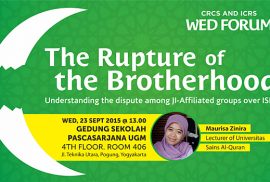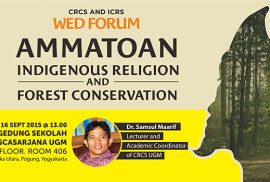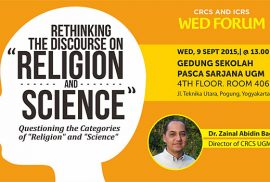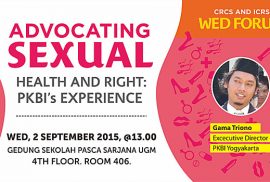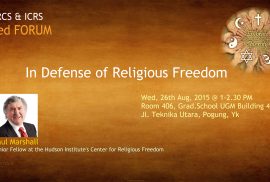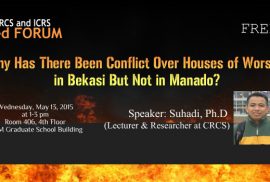
Abstract
The presentation attempts to demonstrate that jihadism is not monolithic. In addition, it aims to obliterate generalizing assumption that entire Indonesian jihadists support ISIS. In the Jemaah Islamiyah body—the biggest militant network in Southeast Asia—for instance, subdivision of its sympathizers is becoming more evident. The dispute is strikingly public after fierce debates over support for the Islamic State of Iraq and Syria (ISIS). Majelis Mujahidin Indonesia (MMI) and Jemaah Anshar al-Tauhid (JAT)—the splinter cells of the Jemaah Islamiyah—hold contrasting perspectives on the Islamic State. The former refuses to pledge allegiances with ISIS, arguing that the caliphate is invalid, while the latter sees it as legitimate, requiring all its members to render support for the Islamic State. This dispute evidently indicates fragmentation in the Jemaah Islamiyah body in ideology, strategy and political goal. This presentation will explore such disintegration and its effects to Indonesian Jihadists’ future political struggle.
Speaker
Maurisa Zinira is the Lecturer of Universitas Sains of Al-Quran and UIN Walisongo Semarang. After completing master degree of religious studies from Center of Religion and Cross-Cultural Studies (CRCS) Universitas Gadjah Mada, Zinira continue his master degree in Department of Religious Studies, Florida International University where she achieves outstanding student achievement.
Wednesday Forum News

Abstract
Ammatoans of Sulawesi in the eastern part of Indonesia hold religious ideas of social actors that extend beyond human beings. Perceiving both human and non-human beings as equal and constitues inter subjective relationships, Ammatoans’ everyday behaviors and practices is set in this religious perception, including forest conservation. The forest, as vital part of Ammatoans’ life, is conserved by sets of regulations and punishment that restrictly enforced. This presentation will explores how the ideas and practices of Ammatoans’ forest conservation illustrate what scholars have called “religious ecology”.
Speaker
Dr. Samsul Maarif is the Secretary and Academic Coordinator of the Center for Religious and Cross-cultural Studies (CRCS), Graduate School of Universitas Gadjah Mada, Yogyakarta, Indonesia. Achieving Ph.D from Arizona State University, Temple, in Religious Studies and holding two master degree from Florida International University and Universitas Gadjah Mada; both on religious studies, Maarif has long experiences and intensive studies of indigineous religion, especially Ammatoan community.

Abstract
The attempt to expand the discourse of science and religion by considering the pluralistic landscape of today’s world requires not only adding new voices from more religious traditions but a rethinking of the basic categories of the discourse, that is, “science,” “religion,” and the notion that the main issue to be investigated is the relationship between the two. Making use of historical studies of science and religion discourse and a case study from Indonesia, this article suggests a rethinking of the categories, including giving more attention to indigenous religions. The presentation will be based on a paper published in Zygon: Journal of Religion and Science [Zygon, vol. 50, no. 2 (June 2015)].
Speaker:
Dr. Zainal Abidin Bagir, is the Director of the Center for Religious and Cross-cultural Studies (CRCS), Graduate School of Gadjah Mada University (GMU), Yogyakarta, Indonesia. He is also a member of the Board of Trustee of Indonesian Consortium for Religious Studies (ICRS-Yogya), representing GMU. In 2009 he was appointed as Indonesian Associate for UNESCO Chair in Interreligious and Intercultural Relations—Asia Pacific. Recently he led a research (2008-2009) on four decades of discourse and practice of inter-religious dialogue in Indonesia. At CRCS he teaches Academic Study of Religion, Philosophy of Religion, and Religion, Science and Technology. At the Philosophy Department of GMU he teaches philosophy of science and of technology. He conducts research and writes on subjects related to religion and contemporary issues, with special attention to religion and science and to the Muslim world, and issues on the relation between religious communities.
ABSTRACT
One of the major fears about religious freedom, especially in a country, that values harmony, such as Indonesia, is that there is a conflict between religious freedom, on one hand, and social harmony and economic prosperity, on the other. The latest scientific research offers strong reason to allay this fear: it indicates that religious freedom strengthens other human right, leads to better economic outcomes, and lowers social conflict.”
SPEAKER
Paul Marshall is a Senior Fellow at the Hudson Institute’s Center for Religious Freedom and the author and editor of more than twenty books on religion and politics, especially religious freedom. The most recent out of many books he wrote are Persecuted: The Global Assault on Christians (2013, with Lela Gilbert and Nina Shea), Silenced: How Apostasy and Blasphemy Codes Are Choking Freedom Worldwide (2011, with Nina Shea), and Religious Freedom in the World (2007). His writings have been translated into many languages from Russian, German, to Japanese, Malay, Korean, Arabic, Farsi, and Chinese. He appears in television programs in ABC Evening News; CNN; PBS; Japanese Broadcasting Corporations; and Al Jazeera. His work has been published in the New York Times, Wall St. Journal, Washington Post, and many others. Marshall is also a Distinguished Senior Fellow at the Institute for the Study of Religion at Baylor University; Senior Fellow at the Leimena Institute, Jakarta; and Visiting Professor at the Graduate School of Syarif Hidayatullah State Islamic University (UIN) Jakarta.

Abstract:
The kind of conflict that has kept one HKBP Church community in Bekasi (Greater Jakarta) from having its own house of worship is almost unknown over the building of mosques in the Christian-majority city of Manado in northern Sulawesi. Why? This question about religion, politics, and society in contemporary Indonesia was triggered by the presenter’s research on houses of worship in four parts of Indonesia: Bekasi, Manado, Pontianak (West Kalimantan), and Bali. To answer this question, my Wednesday Forum presentation will discuss two questions: (a) what is the public perception of houses of worship in these two areas, including those of other religions? (b) How does social change (mainly caused by migration) affect interfaith relations and the recognition and protection of houses of worship in the local areas? I usequantitative and qualitative analysis to answer the research questions. I interviewed more than fifty local religious leaders in the aforementioned areas gathered more than 660 questionnaires in order to give a deeper and more satisfying explanation for conflict over houses of worship in Indonesia than has beendone before. My hope is that greater analysis of regional differences will lead to breakthroughs in peacebuilding in Indonesian society.
Speaker:
 Suhadi earned his Ph.D. from the Department of Philosophy, Theology, and Religious Studies, Radboud University Nijmegen. He is a lecturer at Center for Religious and Cross-cultural Studies, Graduate School, Universitas Gadjah Mada.
Suhadi earned his Ph.D. from the Department of Philosophy, Theology, and Religious Studies, Radboud University Nijmegen. He is a lecturer at Center for Religious and Cross-cultural Studies, Graduate School, Universitas Gadjah Mada.

